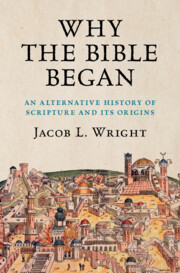Book contents
- Why the Bible Began
- Why the Bible Began
- Copyright page
- Dedication
- Contents
- Figures
- Maps
- Acknowledgments
- Prologue
- Introduction
- Part I The Rise and Fall
- Part II Admitting Defeat
- Part III A New Narrative
- Part IV A People of Protest
- 22 The Matriarch
- 23 The Hero
- 24 The Other
- 25 The Soldier
- 26 The Prophet and the Priest
- 27 The Sage
- 28 The Poet
- 29 The Queen
- 30 Conclusions
- Subject Index
- Scholars Cited
- Biblical References
- References
25 - The Soldier
Sacrificial Death and Eternal Life
from Part IV - A People of Protest
Published online by Cambridge University Press: 13 July 2023
- Why the Bible Began
- Why the Bible Began
- Copyright page
- Dedication
- Contents
- Figures
- Maps
- Acknowledgments
- Prologue
- Introduction
- Part I The Rise and Fall
- Part II Admitting Defeat
- Part III A New Narrative
- Part IV A People of Protest
- 22 The Matriarch
- 23 The Hero
- 24 The Other
- 25 The Soldier
- 26 The Prophet and the Priest
- 27 The Sage
- 28 The Poet
- 29 The Queen
- 30 Conclusions
- Subject Index
- Scholars Cited
- Biblical References
- References
Summary
It all begins with an afternoon dalliance. King David lays eyes on a bathing beauty named Bathsheba. She happens to be the wife of Uriah – one of his top soldiers who was both a non-native (a Hittite) and serving on the front lines. But that does not stop the king: “He sent messengers, and they took her. She came to him, and he slept with her” (2 Samuel 11:4). As fate would have it, Bathsheba, who had been bathing after her menstrual cycle, becomes pregnant after the illicit liaison.
- Type
- Chapter
- Information
- Why the Bible BeganAn Alternative History of Scripture and its Origins, pp. 393 - 405Publisher: Cambridge University PressPrint publication year: 2023



